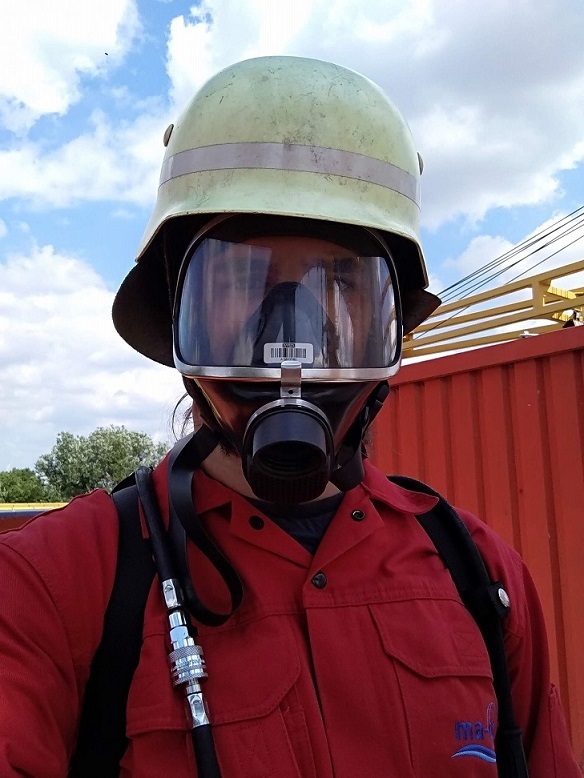Knowledge retention is critical for effective training

Marvin Bielek, Project Manager & Instructional Designer''The answer lies not in more training but better training. We need to create training that facilitates knowledge retention, and which is realistic and relevant to their onboard experiences and day-to-day roles.'' "
Twenty-four hours a day, 365 days a year we are bombarded with information. From television news stations running around the clock to social media feeds that change by the second, it seems impossible to escape the constant barrage of data that finds its way into our everyday lives.
Think I’m overexaggerating? Just look at the rapid growth of internet use over the past 20 years. In the year 2000, the number of internet users was 361 million. Fast forward to 2021 and that number had increased to around 5 billion.
According to August 2021 statistics, in an average internet minute there were:
- 5.5 million Google searches conducted
- 6 million people shopping online
- 100,000 users connected on Teams
- 856 minutes of webinars hosted on Zoom
- 167 million videos watched by TikTok users
Huge numbers – and they all add up to one thing: information overload.

Most of us on shore can simply switch off when we are overwhelmed by information. Those in safety-critical professions do not have that luxury. The bridge of a ship is an environment of extreme stimulation - there are monitors, alarms and screens blinking everywhere. The introduction of Electronic Chart Display and Information Systems (ECDIS), while considered an improvement to the paper charts of years ago, has added to the amount of training that is required by an officer. More training equates to more information.
So, when we entrust nautical officers with the safety of crew, passengers, the ship, cargo and the environment how do we ensure they don’t suffer from information overload and can recall this vitally important information from training courses?
The answer lies not in more training but better training. We need to create training that facilitates knowledge retention, and which is realistic and relevant to their onboard experiences and day-to-day roles.
So goes the Confucius quote: “I hear and I forget. I see and I remember. I do and I understand.” To put this into context, think about your own schooling. Did you learn algebra when you were in high school? If you did, you could be considered to have the knowledge to solve equations. But could you instantly solve one if you were asked right now – without having to refer to a textbook?
Maybe you could, but many people cannot simply because they do not use algebra daily. It is not relevant to their current situation. That is completely normal, and it is no different from training in the maritime industry, or indeed any industry.
If I need to recollect information, for example, to create training about radar targets, I have time to look it up so that I can verify my knowledge and be confident about the accuracy. In a safety-critical industry where decisions often need to be taken in seconds, there is no time to go back and refer to textbooks. The information must be recalled in an instant.

Using the example of ECDIS, switching from to GPS1 to GPS2 is a relatively simple task and can be performed easily on most ECDIS systems. It is covered in courses, but it is a five-minute section in a 16-hour course. If an officer undertook that training two years or even a year ago, is it reasonable to expect the officer to recall all the information they learned right at that moment?
So, what can we do to support officers on board and to support trainees in general? As I said earlier, training needs to relate to real onboard experiences. It is not enough to tell a person a sequence of buttons to press unless they also have a situation that they can relate it to.
In terms of maritime accidents and incidents, there are a multitude of factors that influence human error, for example - inattention and poor judgement; stress and fatigue; complexity of equipment; scheduling pressures; inadequate processes and aids; and one of the biggest – improper training.
It is wrong to assume that if a navigation officer undergoes lots of training that they have the knowledge. What they need is appropriate training - quality over quantity should be the objective. The current most popular training methodology of ‘knowledge dump’ and passive learning is not sustainable, especially when an officer may complete five separate training courses in five days.
The UK’s Marine Accident Investigation Branch and the Danish Marine Accident Investigation Board recently conducted a joined report that was prompted by investigations of groundings in which ECDIS was the primary means of navigation.
They examined incidents since 2008 and their findings underlines how problems around ECDIS training may grow. It highlighted that ECDIS has diversified navigational practices, necessitating different types of training, procedural and technological solutions. Simply, too much information to recall. It is hoped one of the main outcomes from the report will be support for future ECDIS design and training strategies.
Watch Marvin Bieleck’s presentation – Realistic and relevant navigation training is key to safer Shipping - at the SMART4SEA 2022 Virtual Forum.
Enhanced training begins with better scheduling to ensure training is spread across the year, not in one block. A ‘just in time’ approach ensures officers get the training when it is needed most. However, even then, there could be sudden changes in schedules or assignment to a different ship due to operational requirements. This is the reality of an industry and as such needs to be considered too. Therefore, even the best scheduling by itself might not be sufficient.
Secondly, there is microlearning. This is bite-sized learning built up over time. Everyone is using it these days, from watching a YouTube tutorial to checking something on a website. All of this is a kind of microlearning. It may not be structured as such, but that’s what it is.
However, simply splitting up large training into smaller parts doesn’t solve the entire issue as microlearning is most effective in non-critical functions. I can go through an ECDIS tutorial before creating a report, but an officer cannot go through a tutorial before lowering the lifeboat in an emergency.
The third pillar is relevant subject matter expert (SME) inputs - first-hand knowledge is critical in presenting relevant information - and last but by no means least is high quality instructional design. By that, I don’t mean fancy slide design, although it does actually help as it keeps the attention of learners.
Effective knowledge retention needs a combination of smaller, more accessible training paths. Many of the courses we do here at Mintra are sectionalised for that reason – breaking down a larger course into smaller sections provides defined learning objectives and outcomes. But what training needs most of all is to be more relevant; to be linked to the real world and the objective of a real-world task. For us, this comes from close co-operation and careful selection of the SME.
All the points here are linked. None alone solve the issue of knowledge retention, but a combination can. The core takeaway is that the officers should associate the how with the why. Once they achieve this, I believe they are better placed that ever to achieve safety at sea.
Marvin Bielek is a nautical officer with a passion for navigational safety and has been part of the Mintra team since 2014 as a nautical author, elearning developer and training. With a strong interest in ECDIS, his focus is on understanding how modern bridge infrastructure and technology can actually serve navigation officers and the overall safety of the vessel. As a member of Young Ship Cyprus, a member of the Learning and Performance Institute and an MBA in Shipping student, he is constantly looking for new ways to increase training efficiency and knowledge retention
Insights & News
At Mintra, we're so much more than just a team—we're a force driving innovation and excellence in maritime training across Europe.
We’re excited to be taking the stage at one of Europe’s leading showcases of organisational learning.
We are delighted to share the exciting news that our People and Culture team has been shortlisted for the prestigious cHeRries Awards!